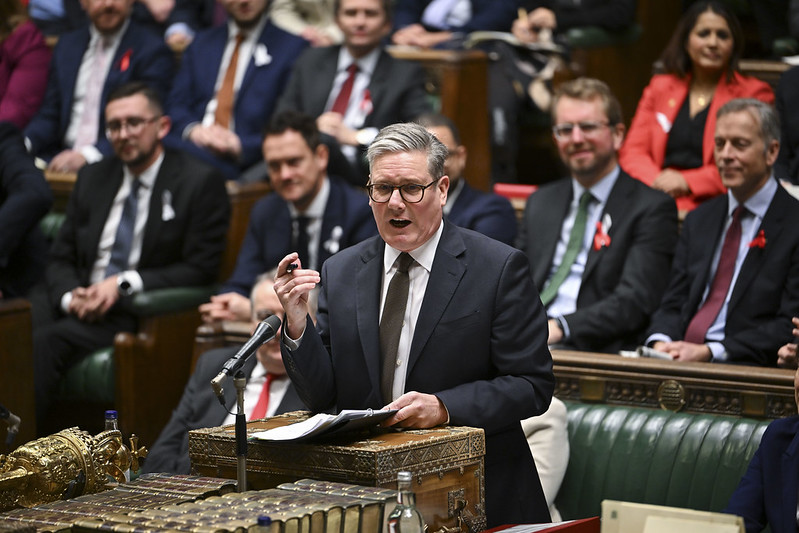
ECONOMY
This week questions were asked of the government about the closure of the Vauxhall plant in Luton. Kemi Badenoch, the Leader of the Opposition, attacked Labour’s “promise to ban the sale of petrol cars by 2030, even if more jobs will be lost?”
Vauxhall announced on the 26th that it would be consolidating all of their factories into Cheshire to better meet the Electric Vehicles mandate.
Over 1,000 jobs will be lost in the Luton area, something that is of deep concern for the Labour Member for Luton South and South Bedfordshire.
Is a loss for Luton Cheshire’s gain?
As Vauxhall aims to meet the government’s mandate to have no petrol and diesel cars by 2035, Cheshire has now received a £50 million investment into the area.
This is not to say that the loss of the factory is good for Luton at all. The Prime Minister expressed his sympathy for Luton’s “difficult and uncertain time for workers and constituents in Luton, and their families.”
The Tory party chastised Starmer for an “attack on workers”, but it seems that this “attack” had begun before the election on July 4th 2024.
In a statement after the PMQ’s, the Secretary for Business and Trade revealed that he was informed of the difficulties of the site “just 10 days after the election.” He further stated that, “The global chief executive officer told us that he felt extremely frustrated by the lack of action from the previous Government, which meant that his desire was to close the Luton plant.”
In September 2023, there was a policy to have 100% of new cars and new vans to be net 0 by 2035. It appears that, having pushed Vauxhall into making this decision, the Conservatives are now criticising the government for the effect of that same policy under Labour.
The loss of 1,100 jobs in Luton is a travesty and will cause real pain within the local area. However, job losses couldn’t have come as a surprise.
The BBC has said that: “They [Labour] know they face an uphill battle to prevent job losses in traditional industries before the promised green jobs become available.” Job losses are now affecting real people and affecting real world consequences.
Real questions need to be asked about the possibility of mass retraining, support systems for those left out of work, and how the Civil Service can expand to meet these needs.
1,100 jobs in Luton will likely not the be the last jobs lost to a greener UK. What is next for the workers is unknown in a government for “working people.”
HEALTH
The Liberal Democrats have again raised concerns over new national insurance contributions for the wider health care sector. Sir Ed Davey asked Sir Keir Starmer if he would: “protect hospices from the national insurance rise?”
The Liberal Democrats have championed protecting GPs and now hospices from increasing national insurance contributions after the budget was announced on the 30th of October 2024. (?)
Keen readers of The Witness will know that, on the 13th of November 2024, Sir Ed Davey raised the question of GPs. The Liberal Democrats claim that, due to higher taxes, “it could cost the average GP surgery the equivalent of 357 appointments per year.”
In widening criticism to include hospices, the Liberal Democrats have shown a deep commitment to this issue.
In the Guardian, Marie Curie, a leading hospice care provider, has announced that this would cost the charity an additional £3 million per year.
The government said that there will be a 10-year plan set out for the NHS.
The 10-year plan is another unknown, coming at an important time for hospice care. The assisted dying bill has drawn more attention back onto support during death, like hospices. Who can know what’s next?
POLICING
New Respect Orders were outlined by Labour this week to tackle anti-social behaviour. The member for Bermondsey and Old Southwark asked the government if the new Respect Orders could be piloted in the London borough of Southwark.
Respect Orders empower the police and the council to “ban persistent offenders from town centres or from drinking in public spots such as high streets and local parks, where they have caused misery to local people.”
Antisocial behaviour is an important issue to Labour. In September 2023 there were 1 million incidents in England and Wales, an 8% decrease from 2022.
One issue that may arise is the broad definition of antisocial behaviour. Ranging from “abandoned vehicles,” “rowdy or inconsiderate behaviour,” “trespassing,” and “sex working.” Such a broad definition could create problems for effective policing. Further questions must also be raised during the trial period about how repeated offenders may be recognised.
The government’s first priority is to make its people safe. But, is this really the right way to achieve it?
Image: Sir Keir Starmer MP, The Prime Minister (Holborn and St Pancras, Labour), House of Commons, 2024 // CC BY-NC-ND 2.0



Average Rating